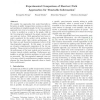Free Online Productivity Tools
i2Speak
i2Symbol
i2OCR
iTex2Img
iWeb2Print
iWeb2Shot
i2Type
iPdf2Split
iPdf2Merge
i2Bopomofo
i2Arabic
i2Style
i2Image
i2PDF
iLatex2Rtf
Sci2ools
117
Voted
ALENEX
2004
2004
Experimental Comparison of Shortest Path Approaches for Timetable Information
We consider two approaches that model timetable information in public transportation systems as shortestpath problems in weighted graphs. In the time-expanded approach every event at a station, e.g., the departure of a train, is modeled as a node in the graph, while in the time-dependent approach the graph contains only one node per station. Both approaches have been recently considered for the earliest arrival problem, but little is known about their relative performance. So far, there are only theoretical arguments in favor of the time-dependent approach. In this paper, we provide an extensive experimental comparison of the two approaches. Using several real-world data-sets we evaluate the performance of the basic models and of several extensions towards realistic modeling. Furthermore, new insights on solving bicriteria problems in both models are presented. The time-expanded approach turns out to be more robust for modeling more complex scenarios, whereas the time-dependent approa...
ALENEX 2004 | ALENEX 2007 | Earliest Arrival Problem | Time-dependent Approach | Time-expanded Approach |
Related Content
| Added | 30 Oct 2010 |
| Updated | 30 Oct 2010 |
| Type | Conference |
| Year | 2004 |
| Where | ALENEX |
| Authors | Evangelia Pyrga, Frank Schulz, Dorothea Wagner, Christos D. Zaroliagis |
Comments (0)

